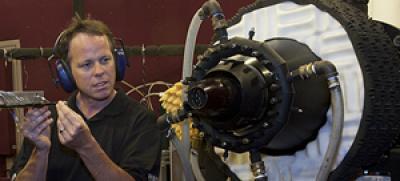Jeff Kastner, research assistant professor in the UC College of Engineering and Applied Science (CEAS), will present on UC discoveries that use chevrons and fluidic injection to reduce supersonic jet noise.

UC's Jeff Kastner researches noise reduction of sophisticated military jet engines.
(Photo Credit: Dottie Stover, University of Cincinnati)
UC research featuring a mathematical model for quick-response, noise-cancellation designed to minimize sudden and unexpected noise caused by road hazards – bumps or potholes for example. A significant step in countering such unexpected roadway noises is the development of an adaptive, active algorithm that would enable the deployment of a rapid-response sound wave that would counter and, in effect, significantly "erase" the perceived road noise heard within the car's cabin when the auto unexpectedly hits a roadway obstacle like a pothole or bump. This development will be presented by UC engineering doctoral student Guohua Sun.
UC researchers, led by Mingfeng Li, research associate in UC's College of Engineering and Applied Science, have developed a mathematical model to reduce noise over a wide range of frequencies. Every noise has its own sound wave frequency. When multiple noises are combined, their different frequencies join together and form a group. These groupings, called clusters of harmonic responses, can be found in a number of mechanical applications like vehicle powertrains, gear vibration and rotating machinery. Making clusters of harmonic responses quieter is far more difficult than individual noises that have a single sound frequency, and it is the issue of noise clusters that is being addressed by this research.
UC mechanical engineering doctoral student Wael Elwali is conducting research focused in the areas of mechanical vibration and vibro-acoustics and noise control engineering. Although the concepts of noise control and vibro-acoustics have been around for quite some time, the type of noise control research Elwali is conducting is still in its computational and modeling stages, and UC is among the few universities exploring this field.